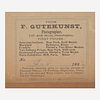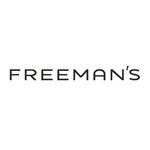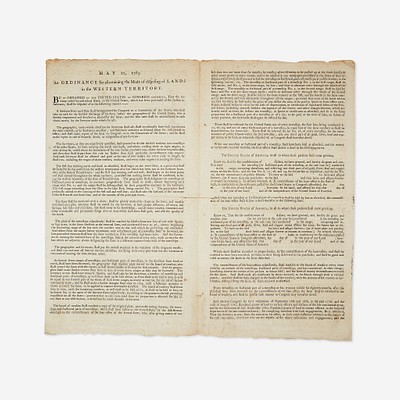[Philadelphia] [Leary's Book Store] Portrait of Philadelphia Bookseller William A. Leary, Sr.
About Seller
2400 Market St
Philadelphia, PA 19147
United States
Established in 1805, Freeman’s Auction House holds tradition close, with a progressive mind-set towards marketing and promotion, along with access to a team of top experts in the auction business. And now with offices in New England, the Southeast, and on the West Coast, it has never been easier to ...Read more
Two ways to bid:
- Leave a max absentee bid and the platform will bid on your behalf up to your maximum bid during the live auction.
- Bid live during the auction and your bids will be submitted real-time to the auctioneer.
Bid Increments
| Price | Bid Increment |
|---|---|
| $0 | $25 |
| $500 | $50 |
| $1,000 | $100 |
| $2,000 | $200 |
| $3,000 | $250 |
| $5,000 | $500 |
| $10,000 | $1,000 |
| $20,000 | $2,000 |
| $30,000 | $2,500 |
| $50,000 | $5,000 |
| $100,000 | $10,000 |
About Auction
Feb 17, 2022
Freeman’s February 17 Books and Manuscripts auction is an Americana collector’s delight, with highlights led by an extremely rare Northwest Territory Land Ordinance from 1785. Curated by Darren WInston, Head of the Books and Manuscripts Department at Freeman's. Freeman's info@freemansauction.com
- Lot Description
[Philadelphia] [Leary's Book Store] Portrait of Philadelphia Bookseller William A. Leary, Sr.
Philadelphia: F. Gutekunst, Photographer, (December, 1886). Large albumen print, mounted to board; Gutekunst label mounted to verso, with date inscribed in pencil. Chip in mount, bottom right corner, tears in same, upper left and right side; scattered soiling. Print: 12 5/16 x 10 in. (313 x 254 mm); board: 17 1/16 x 13 7/8 in. (433 x 352 mm).
This is the only known extant photograph of William A. Leary, Sr., who established the beloved Philadelphia institution, Leary's Book Store, in 1836. An archive of the history and operations of Leary's held in the Special Collections Department at Temple University in Philadelphia has only a photo of his son, William A. Leary, Jr., and some illustrated woodcut maquettes of Leary, Sr. (based on this photo) from an early 20th-century periodical. In their collection we were able to locate a photograph of a display from the shop (pictured here), likely from the early 20th-century, which shows a copy (this very copy?) of this photograph, with a plaque beneath it identifying the man as W.A. Leary, "Founder". A identically sized and mounted albumen print by Gutekunst, of Leary, Jr., dated a year after this photograph, is located in the archive. Leary, Sr. died in 1865, and his son in 1874, so we suspect this photograph, along with the one of his son, were made for the aforementioned display in homage to them after Edwin S. Stuart and Charles Mann acquired the bookstore from the Leary estate.
An extraordinarily rare, and perhaps unique, piece of American bibliophilia.
Leary's Book Store was one of the earliest and longest continuously running bookstores in the United States, operating from 1836-1969. It was founded in 1836 by William A. Leary, Sr. (1816-65), as a sidewalk book stall on North Second Street near Old Market Street. Due to his business's proximity to this-then popular marketplace, his business grew rapidly, and after running his bookshop in numerous locations, he finally settled at 138 North Second Street. The store was nationally renowned for its multitudinous and inexpensive selection, as well as for Leary, Sr.'s managing style of allowing customers to peruse the shelves uninterrupted by his sales team. Leary, Sr., operated the store until his death in 1865, when it was taken over by his son, William A. Leary, Jr. (d.1874). In 1868, Leary, Jr., relocated the store to Fifth and Walnut Street, a few blocks away, across from Independence Hall, to attract the bustling crowds of lawyers, tourists, and professionals. When Leary, Jr.'s failing health, attributed to his service in the Civil War, increasingly limited his ability to run the shop, he hired 13-year old Edwin S. Stuart (1853-1937), who quickly rose to manage the entire operation. Soon after Leary, Jr.'s death in 1874 the store was taken over by Stuart, who renamed it, Leary, Stuart, & Co., and moved it to its final location at 9 South Ninth Street, in the shadow of the towering Gimbel's department store. After 133 years in continuous operation, Leary's closed in 1969, and its contents were auctioned by this very house, Freeman's. Memorably, during the clear out of the store an original first printing of John Dunlap's Declaration of Independence was discovered tucked into a scrapbook, and was auctioned on Wednesday, May 7, 1969, fetching over $400,000. This "Lost" Declaration now resides at the Dallas Public Library.
- Shipping Info
-
No lot may be removed from Freeman’s premises until the buyer has paid in full the purchase price therefor including Buyer’s Premium or has satisfied such terms that Freeman’s, in its sole discretion, shall require. Subject to the foregoing, all Property shall be paid for and removed by the buyer at his/ her expense within ten (10) days of sale and, if not so removed, may be sold by Freeman’s, or sent by Freeman’s to a third-party storage facility, at the sole risk and charge of the buyer(s), and Freeman’s may prohibit the buyer from participating, directly or indirectly, as a bidder or buyer in any future sale or sales. In addition to other remedies available to Freeman’s by law, Freeman’s reserves the right to impose a late charge of 1.5% per month of the total purchase price on any balance remaining ten (10) days after the day of sale. If Property is not removed by the buyer within ten (10) days, a handling charge of 2% of the total purchase price per month from the tenth day after the sale until removal by the buyer shall be payable to Freeman’s by the buyer. Freeman’s will not be responsible for any loss, damage, theft, or otherwise responsible for any goods left in Freeman’s possession after ten (10) days. If the foregoing conditions or any applicable provisions of law are not complied with, in addition to other remedies available to Freeman’s and the Consignor (including without limitation the right to hold the buyer(s) liable for the bid price) Freeman’s, at its option, may either cancel the sale, retaining as liquidated damages all payments made by the buyer(s), or resell the property. In such event, the buyer(s) shall remain liable for any deficiency in the original purchase price and will also be responsible for all costs, including warehousing, the expense of the ultimate sale, and Freeman’s commission at its regular rates together with all related and incidental charges, including legal fees. Payment is a precondition to removal. Payment shall be by cash, certified check or similar bank draft, or any other method approved by Freeman’s. Checks will not be deemed to constitute payment until cleared. Any exceptions must be made upon Freeman’s written approval of credit prior to sale. In addition, a defaulting buyer will be deemed to have granted and assigned to Freeman’s, a continuing security interest of first priority in any property or money of, or owing to such buyer in Freeman’ possession, and Freeman’s may retain and apply such property or money as collateral security for the obligations due to Freeman’s. Freeman’s shall have all of the rights accorded a secured party under the Pennsylvania Uniform Commercial Code.
-
- Buyer's Premium



 EUR
EUR CAD
CAD AUD
AUD GBP
GBP MXN
MXN HKD
HKD CNY
CNY MYR
MYR SEK
SEK SGD
SGD CHF
CHF THB
THB![[Philadelphia] [Leary's Book Store] Portrait of Philadelphia Bookseller William A. Leary, Sr.](https://s1.img.bidsquare.com/item/l/1094/10945339.jpeg?t=1NcmVf)
![[Philadelphia] [Leary's Book Store] Portrait of Philadelphia Bookseller William A. Leary, Sr.](https://s1.img.bidsquare.com/item/s/1094/10945339.jpeg?t=1NcmVf)











